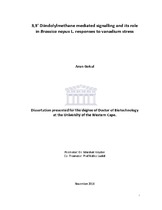3,3' Diindolylmethane mediated signalling and its role in Brassica napus L. responses to vanadium
Abstract
Anthropogenic activities such as mineral mining, improper watering practices, and
the use of heavy metal contaminated fertilizers have caused an influx of heavy
metals into arable lands. These heavy metals may have a negative impact on plant
growth, as they are able to increase ROS species within plants resulting in plant
metabolism deterioration and tissue damage. Heavy metals also have the ability to
render important enzymes non-functional or may decrease their activity resulting in
poor growth. Vanadium was used as the heavy metal of choice in this study, as
South Africa is one of the top producers of this metal worldwide. In an effort to
improve growth of crop plants, mechanisms have to be identified to increase growth
under vanadium stress. One method to increase growth is the use of exogenously
applied signalling molecules. In this study, one such compound 3,3'
Diindolylmethane (DIM) was investigated to identify whether it had growth
promoting properties.

